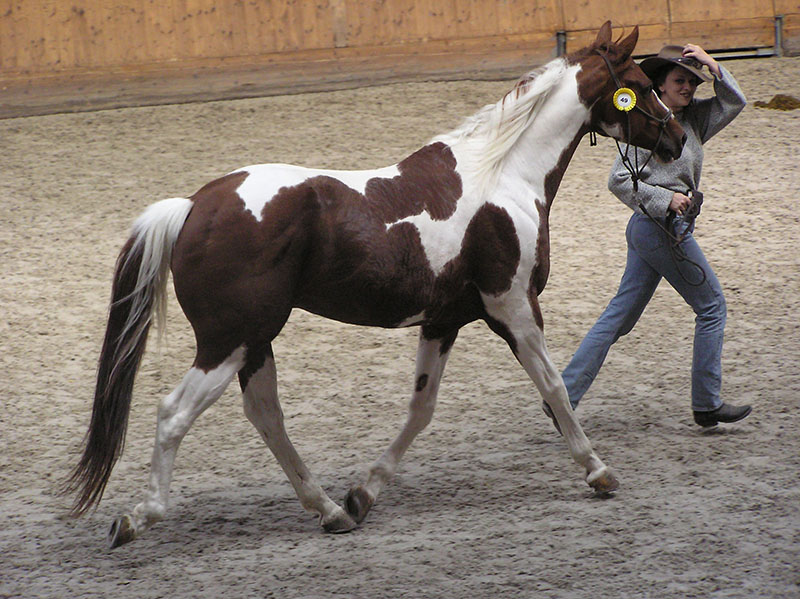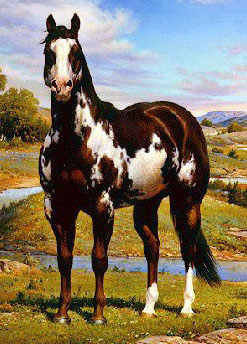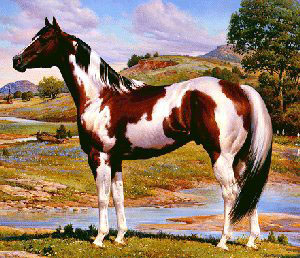Paint Horses
 A Colorful Part of Our Western Heritage.
A Colorful Part of Our Western Heritage.
Let your imagination carry you back to a simpler time. A time when wide open spaces under clear, crisp skies beckoned to come explore the wild frontier. Rediscover those basic values and simple pleasures on the back of a colorful horse. Celebrate this chance to return to the roots of the American West with a unique, living legend - the American Paint Horse.
Decorated by nature, the origins of the Paint Horse in North America can be traced back to the two-toned horses introduced by the Spanish explorers, descendants of horses from North Africa and Asia Minor. Inevitably, some of these colorful equines escaped to create the wild herds of horses roaming the Great Plains. Captured and gentled, they raced alongside the vast herds of buffalo and traveled hundreds of miles on cattle drives. Cherished by the finest horsemen of the Western frontier, both Native Americans and cowboys sought the hardy horses loudly splashed with color.
Over time, breeders gradually improved the conformation and athletic ability of the rugged descendants of wild mustangs and cow ponies. Each generation passed its unusual and unique coat patterns and coloring to the next, creating the American Paint Horse. Today, the stock-type conformation, natural intelligence and willing disposition make the American Paint Horse an ideal partner for pleasure riding, showing, ranching, racing, rodeoing, trail riding, or just as a gentle friend for the kids.
Color and Conformation: a Distinctive Combination
 While the colorful coat pattern is essential to the identity of the breed, American Paint Horses have strict bloodline requirements and a distinctive body type. To be eligible for registry, a Paint must come from stock registered with the American Paint Horse Association, the American Quarter Horse Association, or the Jockey Club (Thoroughbreds). The result is an intelligent stock-type horse that is extraordinarily versatile, powerful and athletic with unequaled beauty. Paints are stockier and more powerfully muscled than some other light horse breeds. Though generally short-coupled, strong-boned and well-balanced, American Paints also exhibit exceptional refinement and beauty, especially about the head and neck.
While the colorful coat pattern is essential to the identity of the breed, American Paint Horses have strict bloodline requirements and a distinctive body type. To be eligible for registry, a Paint must come from stock registered with the American Paint Horse Association, the American Quarter Horse Association, or the Jockey Club (Thoroughbreds). The result is an intelligent stock-type horse that is extraordinarily versatile, powerful and athletic with unequaled beauty. Paints are stockier and more powerfully muscled than some other light horse breeds. Though generally short-coupled, strong-boned and well-balanced, American Paints also exhibit exceptional refinement and beauty, especially about the head and neck.
Color patterns differentiate the American Paint Horse from other stock-type breeds. Each horse has a unique combination of white and any one of the colors of the equine rainbow: black, bay, brown, chestnut, dun, grulla, sorrel, palomino, gray or roan.
Paint or Pinto? A Question of Bloodlines
 The terms "Paint" and "Pinto" are often confused when referring to a horse with a light and dark coat pattern. In fact, they have different meanings. The Pinto Horse Association is a color registry, and Pintos can be any breed. Paints are APHA-registered horses that can prove parentage from one of the three approved registries AQHA, TB and APHA, as well as meet a minimum color requirement. While a loud-colored horse could be double-registered if it met the breed standards specified by each registry, the two registries are independent.
The terms "Paint" and "Pinto" are often confused when referring to a horse with a light and dark coat pattern. In fact, they have different meanings. The Pinto Horse Association is a color registry, and Pintos can be any breed. Paints are APHA-registered horses that can prove parentage from one of the three approved registries AQHA, TB and APHA, as well as meet a minimum color requirement. While a loud-colored horse could be double-registered if it met the breed standards specified by each registry, the two registries are independent.
For registration and breeding purposes, American Paint Horses are categorized by their specific color patterns.
The tobiano pattern (pronounced: tow be yah' no) is distinguished by head markings like those of a solid-colored horse; their heads may be completely solid, or have a blaze, strip, star or snip. Generally, all four of the tobiano's legs are white, at least below the hocks and knees. Their spots are regular and distinctly oval or round and extend down the neck and chest, giving the appearance of a shield. Usually a tobiano will have the dark color on one or both flanks - although a tobiano may be either predominantly dark or white. The tail is often two colors.
The overo pattern (pronounced: oh vair' oh) may also be either predominantly dark or white. But typically, the white on an overo will not cross the back of the horse between its withers and its tail. Generally, one or all four legs will be dark. Also notable is that overos have bold white head markings such as a bald face. Overos generally have irregular, scattered markings. The horse's tail is usually one color.
However, not all coat patterns fit neatly into these two categories. For this reason, a number of years ago the APHA expanded its classifications to include "tovero" (pronounced: tow vair' oh) to describe horses that have characteristics of both the tobiano and overo patterns.
An Association as Special as its Members
The American Paint Stock Horse Association was formed in 1962 by horsemen and women who loved the abilities of the Western stock-type horse, but also treasured the unusual color patterns of the American Paint. The organization has grown from a registry of 3,800 horses at its foundation to more than a quarter of a million horses worldwide today. The number continues to grow with more than 25,000 foals registered last year, making the APHA the third largest equine registry in the United States based on the number of foals registered annually.
Although the APHA's primary mission is to record pedigrees, the association is also dedicated to promoting the history, breeding, training, showing, racing, sales and enjoyment of American Paints.
But the heart of the APHA is its members, for the mission of the association and the programs it sponsors reflect their interests and their love of the American Paint Horse. As a result, the APHA has developed programs for every level of interest and skill. If it's competition you crave, whether you are a youth, amateur, or professional, team up with a natural athlete and choose from local shows to world championships. Perhaps you're seeking to explore new trails. Saddle up on a Paint and join the leisure riding program Ride America, or participate in the annual APHA-sponsored trail ride. If your goal is to reach new levels of performance, a Paint can take you there be it in eventing or team penning. And the association has the Outside Competitive Activities Program to record your achievements in those areas as well.
References
American Paint Horse Association, P.O. Box 961023, Fort Worth, TX 76161-0023
Phone: (817) 834-2742
